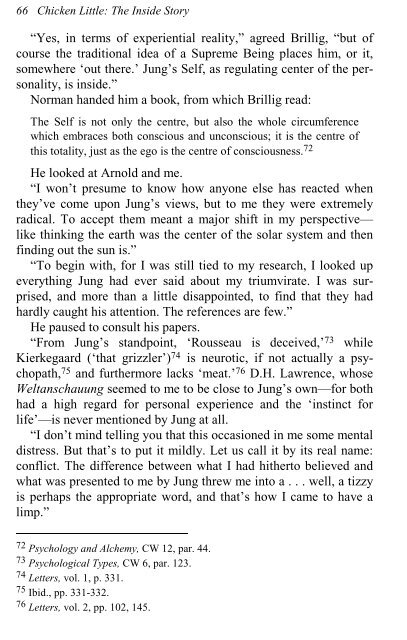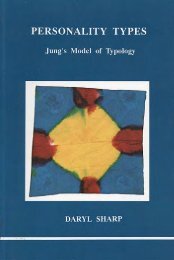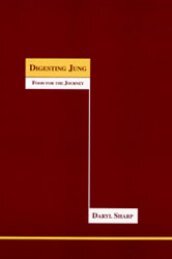Chicken Little: The Inside Story (A Jungian ... - Inner City Books
Chicken Little: The Inside Story (A Jungian ... - Inner City Books
Chicken Little: The Inside Story (A Jungian ... - Inner City Books
Create successful ePaper yourself
Turn your PDF publications into a flip-book with our unique Google optimized e-Paper software.
66 <strong>Chicken</strong> <strong>Little</strong>: <strong>The</strong> <strong>Inside</strong> <strong>Story</strong><br />
“Yes, in terms of experiential reality,” agreed Brillig, “but of<br />
course the traditional idea of a Supreme Being places him, or it,<br />
somewhere ‘out there.’ Jung’s Self, as regulating center of the personality,<br />
is inside.”<br />
Norman handed him a book, from which Brillig read:<br />
<strong>The</strong> Self is not only the centre, but also the whole circumference<br />
which embraces both conscious and unconscious; it is the centre of<br />
this totality, just as the ego is the centre of consciousness. 72<br />
He looked at Arnold and me.<br />
“I won’t presume to know how anyone else has reacted when<br />
they’ve come upon Jung’s views, but to me they were extremely<br />
radical. To accept them meant a major shift in my perspective—<br />
like thinking the earth was the center of the solar system and then<br />
finding out the sun is.”<br />
“To begin with, for I was still tied to my research, I looked up<br />
everything Jung had ever said about my triumvirate. I was surprised,<br />
and more than a little disappointed, to find that they had<br />
hardly caught his attention. <strong>The</strong> references are few.”<br />
He paused to consult his papers.<br />
“From Jung’s standpoint, ‘Rousseau is deceived,’ 73 while<br />
Kierkegaard (‘that grizzler’) 74 is neurotic, if not actually a psychopath,<br />
75 and furthermore lacks ‘meat.’ 76 D.H. Lawrence, whose<br />
Weltanschauung seemed to me to be close to Jung’s own—for both<br />
had a high regard for personal experience and the ‘instinct for<br />
life’—is never mentioned by Jung at all.<br />
“I don’t mind telling you that this occasioned in me some mental<br />
distress. But that’s to put it mildly. Let us call it by its real name:<br />
conflict. <strong>The</strong> difference between what I had hitherto believed and<br />
what was presented to me by Jung threw me into a . . . well, a tizzy<br />
is perhaps the appropriate word, and that’s how I came to have a<br />
limp.”<br />
72 Psychology and Alchemy, CW 12, par. 44.<br />
73 Psychological Types, CW 6, par. 123.<br />
74 Letters, vol. 1, p. 331.<br />
75 Ibid., pp. 331-332.<br />
76 Letters, vol. 2, pp. 102, 145.










